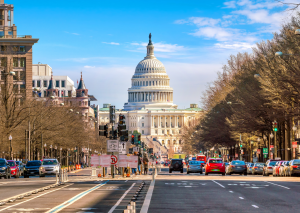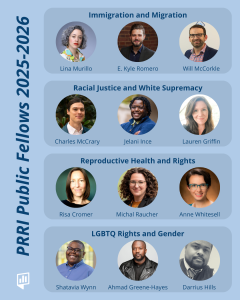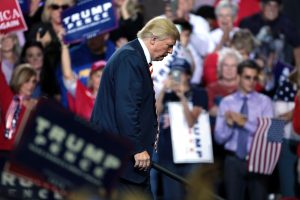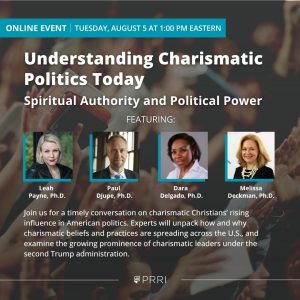President Trump recently announced that his administration will seek the death penalty for all murder cases in Washington, D.C., framing the move as part of a broader effort to fight crime. However, it is uncertain
WASHINGTON (August 28, 2025) — Today, Public Religion Research Institute (PRRI), a nonprofit, nonpartisan research organization, announced the selection of 12 interdisciplinary scholars as PRRI Public Fellows, the organization’s eighth cohort of fellows and the
Youssef Chouhoud, Ph.D., is an associate professor of political science at Christopher Newport University, and a 2024-2025 PRRI Public Fellow. Legal battles over same-sex marriage, service refusals, and gender-affirming care frequently position religion and LGBTQ
As the U.S. economy shows early signs of strain amid ongoing trade tensions and new federal legislation, public opinion of President Donald Trump remains sharply divided. Policies, such as the decision to mobilize National Guard
In his latest effort to end the Russia-Ukraine war, President Donald Trump is meeting with Russian President Vladimir Putin today — without Ukrainian leaders — to discuss a potential peace deal that would likely require
Seth Gaiters, Ph.D., is an assistant professor of Religious Studies and Africana Studies at North Carolina State University and a 2024-2025 PRRI Public Fellow. Witnessing the start of the demolition of D.C.’s Black Lives Matter
On May 19, 2025, Congress passed the “Take It Down Act”, a bill that makes both actual and AI-produced nonconsensual explicit content, also known as “revenge porn,” illegal. Additionally, other issues related to pornography have
Allyson Shortle, Ph.D., is an associate professor and director of graduate studies in political science at the University of Oklahoma and a 2024-2025 PRRI Public Fellow. Michael R. Fisher Jr., Ph.D., is an assistant professor
In the 2010s, the term “exvangelical” emerged to refer to individuals who have left evangelicalism and who have chosen to join non-evangelical Christian traditions, embrace non-Christian beliefs, or leave religion entirely. The exvangelical community has










